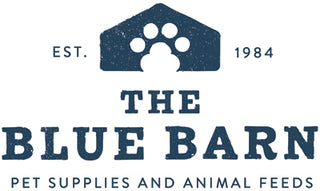
Garden Birds Advice
Feeding garden birds have become increasingly more popular over the years. With such a wide variety of products to entice all sorts of birds to your garden.
Here at The Blue Barn, you can find all sorts of seed, seed mixtures and treats available in sizes ranging from 1kg to 20kg bags.
Our bird feed is sourced from Johnston & Jeff Ltd a top quality bird seed producer.
When To Feed Your Garden Birds
Spring & Summer
During the summer months, birds require high protein foods, as they tend to molt around this time of year. However only selected foods should be fed at this time as it can do then more harm than good.
This includes;
- Black sunflower seeds
- Mealworms
- Raisins/currants
- Summer Seed Mixes
- Insectivorous mixes
- Fruit (apples/ bananas, grapes)
Autumn & Winter
During the colder months, birds require high energy (high fat) foods to maintain their fat reserves in order to survive the winter nights. Food and water should be put out on a regular basis and in severe weather conditions twice a day, morning and early afternoon. Try and establish a feeding routine as the birds will become used to it and visit your garden accordingly. Never leave uneaten food to accumulate around the feeders as this can attract vermin.
Foods to avoid would be whole peanuts, dry hard foods, large chunks of bread, or fats during the spring or summer months as these can be harmful to their nestlings if tried to be fed. If there is a natural food shortage birds will rely on what you offer them and if the situation is bad enough they will also take this to the nest. This can be very harmful to young chicks as they can choke, therefore it best not to offer foods that can likely cause a problem. As temporary food shortages can occur at almost any time of the year, and if this happens during the breeding season, extra food on your bird table can make a big difference to the survival of young as long as it is the right food being offered. Fat balls can also go soft and rancid in warm weather and should not be given.
Where To Place Feeders and Tables
Quiet
If possible, your bird table/feeder should be placed where the birds will not be disturbed regularly by human traffic that is, the back garden rather than the front, and by a 'quiet' window if you have the choice. Not too far from the house though as the fun of feeding birds is being able to watch them!
Open & Safe
Birds like a good all-round view so they can see they are safe from predators while they feed. This should be away from fences and trees as these are perfect ambush sites for cats.
Sheltered
In a position where it gets neither too much sun nor too much cold wind.
Lookout Point
A small bush about two metres away from the table or feeder gives the birds somewhere safe to perch while they look to see if it is safe to feed, to 'queue up' for a place to go feed, and to hide if disturbed. Bramble clippings placed around the bush will prevent cats from lurking.
Top Tips For Keeping Your Garden Birds Healthy
Good hygiene is particularly important during the summer months. The warmer weather can make food go off quicker, and can provide ideal conditions for harmful bacteria. If you find the birds are not clearing the food within a few days then reduce the amount being offered.
- Use a bird table or hanging feeder as putting food on the ground can attract rats which often carry diseases. These can be harmful to birds and humans.
- Keep your bird tables, feeders and surrounding areas clean and free from droppings or mouldy food as this can provide breeding grounds for parasites and bacteria.
- Clean and wash your bird table and hanging feeders regularly (ideally, using a 5% disinfectant solution), and move feeding stations to a new area every month to prevent droppings accumulating underneath.
- Water containers should be rinsed out daily, especially during the warmer months, and allowed to dry out before fresh water is added as droppings can accumulate in bird baths.
- Personal hygiene is also important. Don't bring your feeders into your house to clean them do it outside using separate utensils. Wear gloves when cleaning feeders and bird tables, and particularly if you need to handle a sick or a dead bird in your garden. Always wash your hands when you've finished.
Identify The Garden Birds
Feeding Guide
|
Type of Bird Feed/ Blends
|
Especially Good For
|
|
Wild Bird Food
|
|
|
Superior Wild Bird Food - Husk Free
|
|
|
Premium Wild Bird Food- Husk Free, Wheat Free, with suet |
Stonechat, Starling, Blackbird, Yellow Hammer - will also attract doves and pigeons, and Wrens will come to the suet pellets
|
|
Spring & Summer Mix
|
Virtually all birds love this blend
|
|
Essential High Energy
|
Virtually all birds love this blend |
|
Robin and Songbird Mix |
|
|
Wild Finch Mix
|
|
|
Peanuts
|
|
|
Peanut Granules
|
|
|
Monkey Nuts
|
Excellent for all Tits |
|
Black Oil Sunflower Seeds |
|
|
Sunflower Hearts
|
|
|
Niger Seed
|
|
|
Suet/ Fat Balls/ Suet Pellets/ Feast/ Plus Foods
|
|
|
Dried Mealworms
|
|
